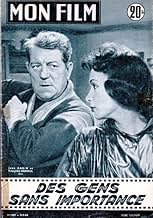This is a working class picture, and films about labor and the labor struggle, deserve a separate category from working class films. The mass of working class literature and film deal primarily with families of the workers. The genre has evolved more recently, to include realistic (and entertaining) depictions of the working conditions in offices, and businesses. By the definition of a working class film, this one is ahead of it's time.
Viard is trying to use his skills at the highest level of his ability. He turns down a temporary job. He also asserts his right to decide which routes he deserves. This is not management/labor in an either or dialectic struggle, this is the labor management partnership which came out of WWII when industry needed more sophisticated, and skilled workers.
The title reflects the needs of working class people to achieve that level of importance. Viard jumps into the generation gap, when his daughter cruelly mocks him. This is a man torn up by the changes in society, who accepts his fate (somewhat) stoically. He is a real hero, in that sense of the term.
Gabin captures the physicality of the Viard, a man defined by his occupation, a man who puts more into his job, than merely his back. His romance is part fatherly, although Clothilde is closer to his daughters' age, she respects him. The respect she shows Viard, is more important than her physical relationship with the middle-aged man.
He then risks his job to be closer to her, to the source of that respect, again not out of vanity, but a sense of completion she provides, and he ultimately proves to be her undoing. Great stuff.

![Regarder Bande-annonce [OV]](https://m.media-amazon.com/images/M/MV5BYzUwNTFlYWUtZmQ0NS00MmE1LWE4YzYtYjYzNjgxZmQxMzdhXkEyXkFqcGdeQXRyYW5zY29kZS13b3JrZmxvdw@@._V1_QL75_UX500_CR0)






























